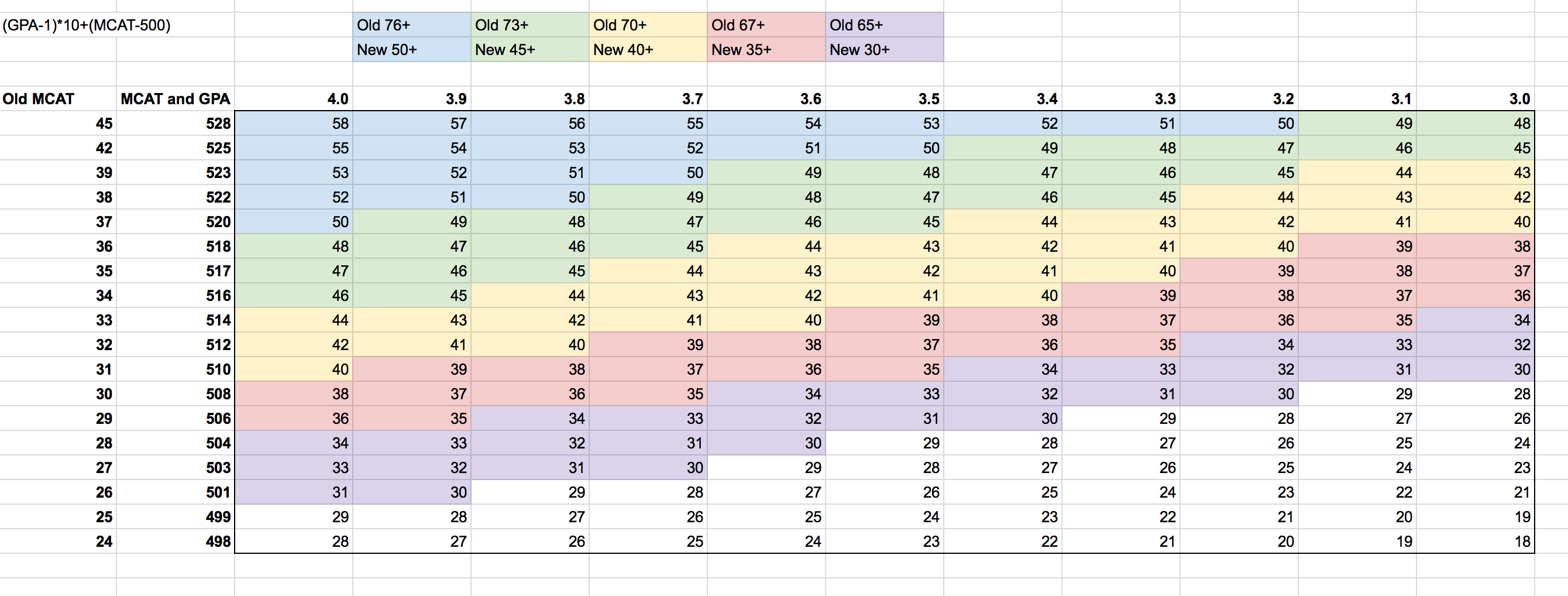Alright guys, I have a proposed conversion for you all. The formula is:
(GPA-1)*10 + (MCAT-500) = Score
The max score (4.0/528) comes out to 58. I've gone through and made correlates between the old
LizzyM score and the new one (which can be seen in the chart below). Examples:
Old
76 (i.e. 3.8/38 or 3.9/37) is new
50. This is generally the number to shoot for for top schools.
Old
73 (i.e. 3.8/35 or 3.9/34) is new
45. This is generally a good number for mid tiers while possibly being competitive for some top tiers.
Old
70 (i.e. 3.7/33 or 3.9/31) is new
40. This is generally where a "competitive" applicant for med school falls around.
Old
67 (i.e. 3.6/31 or 3.7/30) is new
35. This is around the accepted applicant median.
Old
65 (i.e. 3.6/29 or 3.7/28) is new
30. This is highly competitive for DOs and marginal for MD.
I didn't continue my color coordination after this, but you get the idea.
This score not only is easy to calculate, but provides convenient benchmarks for comparing scores to old LizzyM scores (down by 5's from 50 for new, down by 3's from 76 for old). It does break down at the MCAT extremes, but so did the old score (45/3.1 still gave you 76, for example).
Here are some spot checks:
3.7/32 is 69 old, which should be around 39ish new. Formula gives, for 3.7/512, 39, spot on!
3.4/38 is 72 old, which should be around 43-44 new. Formula gives, for 3.4/522, 46, so it's a little high, but it's also an extreme MCAT place.
3.9/32 is 71 old, which should be around 41-42 new. Formula gives, for 3.9/512, 41, right on!
3.3/36 is 69 old, which should be about 38-39 new. Formula gives, for 3.3/518, 41, so again, a little high.
This seems to work best the more "matched" the GPA and MCAT are, and gives slight favor to higher MCAT scores at the opposing extremes, but overall should be a decent estimate.
Obviously you can make it more accurate (by doing exact percentile conversions), but that would inevitably take away the simplicity of the calculation, which is the whole point. Also, because the new MCAT has multiple scores per old MCAT score, you're going to be hard pressed to find an algorithm that perfectly fits everything.
As we move away from old MCAT scores entirely, the conversion factor equality becomes far less important, and the balance between MCAT and GPA becomes the most important thing (here GPA is weighted out of 30 while MCAT is weighted out of 28, and the overall score can go as low as -32 if you have a 468 MCAT and 0.00 GPA). One MCAT point is still equivalent to 0.1 GPA points, just like the old scale.
See what you guys think!




